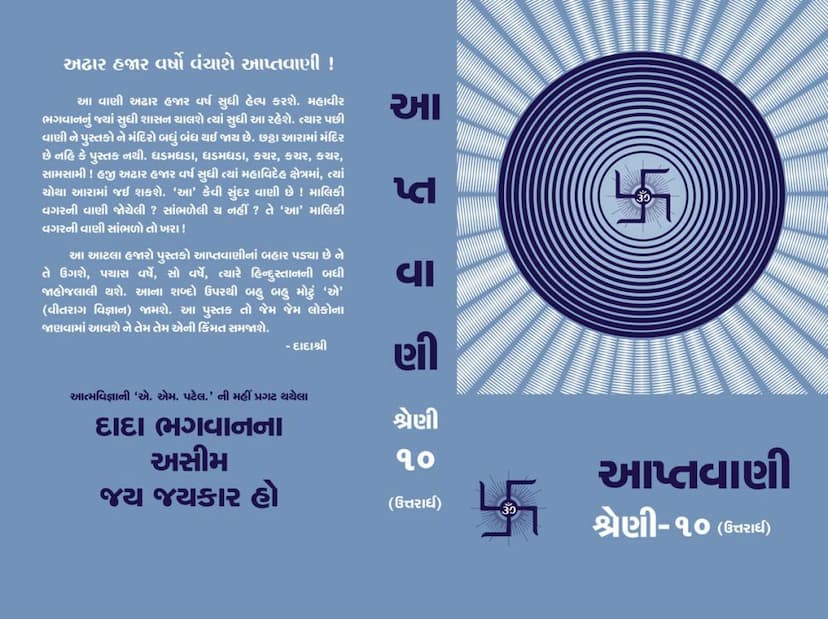Aptavani 10 U
Added to library: September 1, 2025

Summary
This document is the Gujarati text of "Aptavani 10 (U)" by Dada Bhagwan, published by Mahavideh Foundation. It focuses on the nature and understanding of the inner faculties of the human being, as explained by Dada Bhagwan.
Here's a breakdown of the key themes and concepts covered in the provided text:
Core Message:
The central theme revolves around understanding and transcending the inner faculties of mind, intellect, consciousness (chitta), and ego (ahamkar) to attain self-realization and liberation. Dada Bhagwan, through his teachings, aims to guide individuals towards understanding their true nature, which is the pure Self (Soul), distinct from these inner workings.
Key Sections and Concepts:
The book is divided into sections, each delving into a specific inner faculty:
-
Introduction (Page 3, 4, 5, 6, 7, 8, 9, 10, 11, 12, 13, 14, 15, 16, 17):
- Dada Bhagwan's Vision: The text emphasizes Dada Bhagwan's unique approach to spiritual science, called "Akram Vignan" (the incomeless science). This path is described as a direct, shortcut route to self-realization, attained in just two hours.
- The True "Dada Bhagwan": Dada Bhagwan clarifies that the external form is not "Dada Bhagwan." The divine entity residing within, the Pure Soul, is the true "Dada Bhagwan." This Soul is present in everyone, though in an unmanifested form in most.
- Dr. Niruben Amin's Role: It is mentioned that Dada Bhagwan imparted the " Siddhi" (spiritual attainment) of self-realization to Dr. Niruben Amin during His lifetime. Post His physical departure, Dr. Niruben Amin continues to disseminate this knowledge and self-realization to seekers.
-
Part 3: Buddhi (Intellect) (Pages 5-13):
- Innocence vs. Knowledge: The text distinguishes between the innocence of a child and the wisdom of a knowledgeable person. It highlights that while a child is innocent due to a lack of developed intellect, a Gnani Purush (Self-realized being) becomes innocent after reaching the peak of intellectual development and then transcending it.
- Intellect's Nature: Intellect is described as the faculty that shows profit and loss, good and bad, happiness and sorrow, constantly leading to unrest. It is bound to the worldly cycle and is a medium for the ego.
- Intellect vs. Self (Soul): The Self (Soul) is described as self-illuminating and illuminating of others, while intellect can only perceive external things, not the Self.
- Direct vs. Indirect Knowledge: Direct knowledge (from the Soul) is contrasted with indirect knowledge (through intellect, mediated by ego).
- The Role of Egolessness: The text suggests that true understanding and liberation come from a state of egolessness.
- Dada Bhagwan's Approach: Dada Bhagwan's "Akram Vignan" is presented as a scientific, shortcut path that bypasses the limitations of intellect and ego. It can lead to liberation in a very short time.
-
Part 4: Chitta (Consciousness/Mind) (Pages 13-17):
- Nature of Chitta: Chitta is described as the faculty that wanders, unlike the mind, which stays within the body. It can go anywhere, forming exact impressions.
- Purity of Chitta: When chitta is impure, it wanders in transient things, leading to the cycle of birth and death. When it becomes pure, it becomes stable in the eternal. Pure chitta is the Pure Soul itself.
- Path to Purity: Various religious paths aim for chitta purification. However, Akram Vignan offers a two-hour method to achieve this purification and liberation.
- Presence of Mind: The importance of the mind's presence in all actions is emphasized for benefits, while its absence can lead to downfall.
-
Part 5: Ahamkar (Ego) (Pages 17-24):
- The Nature of Ego: Ego is defined as the imputed belief of being something one is not, or the "I" that arises from ignorance. The text highlights the numerous layers of ego, stemming from identifications with the body, relationships, and possessions.
- Transcending Ego: The path to liberation is through the dissolution of ego. The text explains that even the ego that binds through karma dissolves when knowledge is received from a Gnani Purush. The ego that remains to discharge karma is called "discharge ego."
- The Akram Path: The Akram path, through Self-realization, helps dissolve ego, leading to a state of freedom.
- The True "I": The true Self, the Soul, is distinct from ego and all other faculties.
- The Role of Gnani Purush: Only a Self-realized being (Gnani Purush) who has transcended ego can fully explain the origin and dissolution of ego.
Overall Tone and Purpose:
The book is written in a conversational question-and-answer format, typical of Dada Bhagwan's teachings. The language is simple, direct, and aimed at providing practical, experiential understanding of spiritual concepts. The overarching purpose is to reveal the science of the Self and guide the reader towards achieving it through Dada Bhagwan's Akram Vignan. The text emphasizes that true understanding and liberation come from self-realization, which is directly imparted by a Self-realized being.